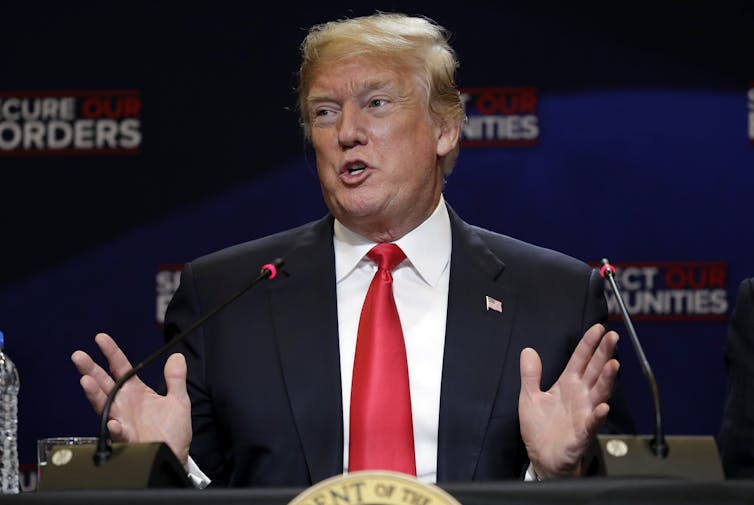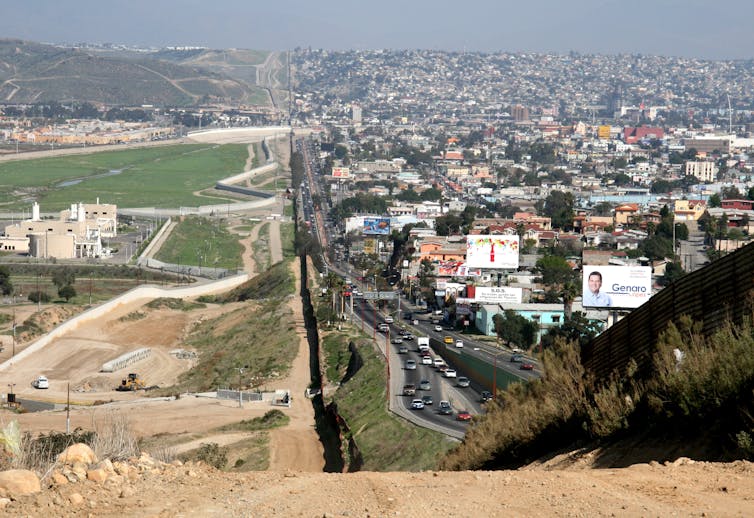Michael Blake, University of Washington
The past few weeks have seen widespread outrage over the Trump administration’s now-defunct policy of separating migrant families at the border. Four members of the president’s Homeland Security advisory council have resigned in protest, citing the “morally repugnant” practice.
Similar conflicts about policing the borders have erupted throughout much of the world. In Europe, the coalition government of Chancellor Angela Merkel barely survived a controversy over how to deal with the continued stream of refugees seeking asylum in Germany.
How people respond to these controversies depends upon what it is that they think the border is set up to protect.
Borders protect from ‘outsiders’
In recent years, philosophers have provided several distinct visions on what the borders are protecting.
One prominent justification for securing the border begins with the thought that each state has its own distinctive national character, and that the state’s borders protect it from being overwhelmed by outsiders. The country is not just a state, then, but a cultural or ethnic nation – and, some people might believe, it ought to ensure that migration does not disturb that composition.

AP Photo/Evan Vucci
President Trump’s criticism of European immigration begins with this idea. He has stated quite categorically that the wave of immigration to Europe would permanently change its culture and that was a “shame.”
From my perspective as a political philosopher, whose work focuses on the political morality of migration, this view assumes that the “real” community in a country can be identified with one particular culture or ethnicity. In doing so, it implicitly announces that all those who are not members of that majority are less important to the state.
This view echoes the ideas of racial and religious superiority that have caused immense harm throughout history. Fascism as an ideology began with the thought that only certain European residents were the true inheritors of Europe’s history. The rest were considered interlopers, who were reducing the grandeur of European civilization.
The ownership of the state
Another justification for the border begins with a notion of property rights. Scholar Ryan Pevnick has argued that the state and its institutions are rightly owned by those who have worked to build and sustain those institutions. They can thus refuse to share their institutions with outsiders – in the same way that I can refuse to share my house with those who have no property rights to enter that house.
There are difficulties here, too. Many people present within a given country may have done very little to actually build that society and its institutions. This does not, however, imply that they are not entitled to the rights associated with citizenship.
But, as importantly, there are many people outside the country who have done a great deal to protect and to preserve that country. During the Iraq War, for example, some Iraqis became translators for the United States Army, at enormous personal risk.
If this view is to be coherent, then these individuals would have a right to cross that border. Indeed, this fact was belatedly recognized by the Trump administration. In February 2017, an exception was made to the travel ban for Iraqi translators who had worked on behalf of the United States.
Preserving democracy

http://www.ngb.army.mil
A final justification for the border reflects the importance of democracy. Widespread migration, it is believed, could undermine social trust and solidarity – both of which are preconditions for democratic self-government.
Migrants from countries without a tradition of democracy, based on this argument, might have neither knowledge of democratic norms nor a moral commitment to the preservation of democracy. Concerns such as these led Belgium to recently introduce a requirement that all potential immigrants coming from outside Europe must sign a “newcomer’s statement” indicating adherence to “European values” – including gender equality and gay rights.
The thought that some outsiders are unlikely to be good democratic citizens, though, has a long and unpleasant history. The United States once barred Chinese nationals from citizenship on similar grounds. American politicians argued that the Chinese civilization was incompatible with any form of government other than “an imperial despotism.”
If democracy is this important, those who value it may have some obligation to use migration policy to help people live under democratic rules. President Ronald Reagan, for example, argued that the borders of the United States should be open to those fleeing Soviet oppression. The freedom of United States, he stated in his farewell address, did not belong to the country alone.
Rather, as Reagan said, the U.S. ought to see herself as the custodian of the freedom of outsiders as well – a suggestion that is increasingly important, as the American debate about borders continues.
Michael Blake, Professor of Philosophy, Public Policy, and Governance, University of Washington
This article was originally published on The Conversation. Read the original article.





